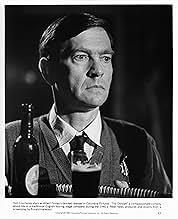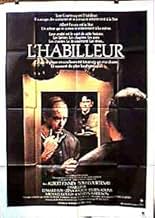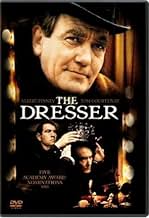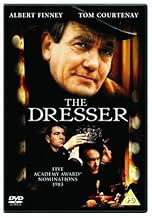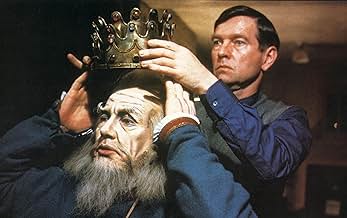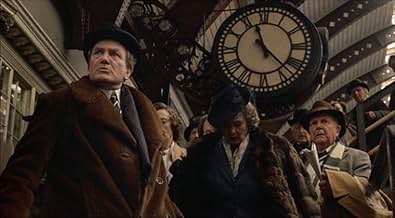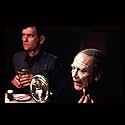AVALIAÇÃO DA IMDb
7,5/10
6 mil
SUA AVALIAÇÃO
O assistente pessoal Norman enfrenta dificuldades para ajudar o veterano ator Sir, que está em declínio, a superar uma apresentação desafiadora de Rei Lear.O assistente pessoal Norman enfrenta dificuldades para ajudar o veterano ator Sir, que está em declínio, a superar uma apresentação desafiadora de Rei Lear.O assistente pessoal Norman enfrenta dificuldades para ajudar o veterano ator Sir, que está em declínio, a superar uma apresentação desafiadora de Rei Lear.
- Indicado a 5 Oscars
- 5 vitórias e 17 indicações no total
Anne Blackman
- Beryl
- (as Anne Mannion)
Avaliações em destaque
Eloquent performances from Finney and Courtney propel this film adaptation of the Ronald Harwood play about a reclusive old actor barely able to make it on stage and his mother-hen valet. It's a true story of friendship and comradeship. Both performers are brilliant in every scene. Bravo!
Albert Finney and Tom Courtenay are brilliant as Sir and his Dresser. Of course the play is brilliant to begin with and nothing can compare with the immediacy and collegiality of theatre, and I think you listen better in theatre; but on the screen we become more intimate, we're 'up-close' more than we are in the theatre, we witness subtle changes in expression, we "see" better as well as listen. Both the play and the movie are wondrous: moving, intelligent, illuminating--of the backstage story of the company, of historical context, of the two main characters, and of the parallel characters in "Lear" itself. If you cannot get to see it in a theatre (I don't imagine it's produced much these days) then, please, do yourself a favor, and get the video.
This is a movie that deserves another look--if you haven't seen it for a while, or a first look--if you were too young when it came out (1983). Based on a play by the same name, it is the story of an older actor who heads a touring Shakespearean repertory company in England during World War II. It deals with his stress of trying to perform a Shakespeare each night while facing problems such as bombed theaters and a company made up of older or physically handicapped actors--the young, able bodied ones being taken for military service. It also deals with his relationship with various members of his company, especially with his dresser. So far it all sounds rather dull but nothing could be further from the truth. While tragic overall, the story is told with a lot of humor and emotions run high throughout. The two male leads both received Oscar nominations for best actor and deservedly so. I strongly recommend this movie to anyone who enjoys human drama, theater--especially Shakespeare, or who has ever worked backstage in any capacity. The backstage goings-on make up another facet of the movie that will be fascinating to most viewers.
What happens backstage is always true drama. And often pure comedy. Such is the case of The Dresser, a film about an effeminate wardrobe man who is devoted to the deteriorating lead of the acting troupe he travels with. The film takes place in one night about a particularly difficult performance of William Shakespeare's King Lear. Albert Finney plays Sir, the lead role of the performance. He is in no condition to perform such a difficult role, yet he perseveres anyways with the help of his Dresser, Norman (Tom Courtenay). The two powerful leads are the highlight of this beautiful film.
The Dresser is what acting is all about. It is an intriguing blend of film acting and stage acting. Albert Finney and Tom Courtenay give exquisite and robust performances. Their conflicting personalities make them a delightful pair to watch interact. The acting in this film has the kind of prowess and impact of a stage performance with its loud and exaggerated movements. This kind of acting only works in certain settings, and The Dresser is a perfect example of where it not only works but is very necessary. It allows for a detachment from reality, drawing one into the theatrical world, something which stands out in such a unique and perplexing way.
Peter Yates directs this film with precise and aesthetically glamorous grandeur. It is a grand film that doesn't go too far out of line and never gets lost in itself. Yates directs with a keen eye for subtle detail and sparkling brilliance. The film is written with the same kind of subdued wit and beauty, making the film fit together nicely. The dialouge is great and the actors who deliver it bring so much life to the characters and script that it makes for a brilliant expose of the acting world.
The Dresser is a great film that accomplishes beauty and immersion without an immaculate setting. The film is subtly fantastic. Definitely check this one out.
The Dresser is what acting is all about. It is an intriguing blend of film acting and stage acting. Albert Finney and Tom Courtenay give exquisite and robust performances. Their conflicting personalities make them a delightful pair to watch interact. The acting in this film has the kind of prowess and impact of a stage performance with its loud and exaggerated movements. This kind of acting only works in certain settings, and The Dresser is a perfect example of where it not only works but is very necessary. It allows for a detachment from reality, drawing one into the theatrical world, something which stands out in such a unique and perplexing way.
Peter Yates directs this film with precise and aesthetically glamorous grandeur. It is a grand film that doesn't go too far out of line and never gets lost in itself. Yates directs with a keen eye for subtle detail and sparkling brilliance. The film is written with the same kind of subdued wit and beauty, making the film fit together nicely. The dialouge is great and the actors who deliver it bring so much life to the characters and script that it makes for a brilliant expose of the acting world.
The Dresser is a great film that accomplishes beauty and immersion without an immaculate setting. The film is subtly fantastic. Definitely check this one out.
I just watched The Dresser this evening, having only seen it once before, about a dozen years ago.
It's not a "big" movie, and doesn't try to make a big splash, but my God, the brilliance of the two leads leaves me just about speechless. Albert Finney and Tom Courtenay are nothing less than amazing in this movie.
The Dresser is the story of Sir, an aging Shakespearean actor (Finney), and his dresser Norman (Courtenay), sort of a valet, putting on a production of King Lear during the blitz of London in World War II. These are two men, each dependent upon the other: Sir is almost helpless without the aid of Norman to cajole, wheedle, and bully him into getting onstage for his 227th performance of Lear. And Norman lives his life vicariously through Sir; without Sir to need him, he is nothing, or thinks he is, anyway.
This is a character-driven film; the plot is secondary to the interaction of the characters, and as such, it requires actors of the highest caliber to bring it to life. Finney, only 47 years old, is completely believable as a very old, very sick, petulant, bullying, but brilliant stage actor. He hisses and fumes at his fellow actors even when they're taking their bows! And Courtenay is no less convincing as the mincing dresser, who must sometimes act more as a mother than as a valet to his elderly employer. Employer is really the wrong term to use, though. For although, technically their relationship is that of employer and employee, most of the time Sir and Norman act like nothing so much as an old married couple.
Yes, there are others in the cast of this movie, but there is no question that the true stars are Finney, Courtenay, and the marvelous script by Ronald Harwood. That is not to say that there aren't other fine performances, most notably Eileen Atkins as the long-suffering stage manager Madge. There is a wonderful scene where Sir and Madge talk about old desires, old regrets, and what might have been.
Although it doesn't get talked about these days, it is worth remembering that The Dresser was nominated for five Academy Awards: Best Actor nominations for both Finney and Courtenay, Best Picture, Best Director (Peter Yates), and Best Adapted Screenplay.
I had remembered this as being a good movie, but I wasn't prepared to be as completely mesmerized as I was from beginning to end. If you want to see an example of what great acting is all about, and be hugely entertained all the while, then I encourage you to see The Dresser.
It's not a "big" movie, and doesn't try to make a big splash, but my God, the brilliance of the two leads leaves me just about speechless. Albert Finney and Tom Courtenay are nothing less than amazing in this movie.
The Dresser is the story of Sir, an aging Shakespearean actor (Finney), and his dresser Norman (Courtenay), sort of a valet, putting on a production of King Lear during the blitz of London in World War II. These are two men, each dependent upon the other: Sir is almost helpless without the aid of Norman to cajole, wheedle, and bully him into getting onstage for his 227th performance of Lear. And Norman lives his life vicariously through Sir; without Sir to need him, he is nothing, or thinks he is, anyway.
This is a character-driven film; the plot is secondary to the interaction of the characters, and as such, it requires actors of the highest caliber to bring it to life. Finney, only 47 years old, is completely believable as a very old, very sick, petulant, bullying, but brilliant stage actor. He hisses and fumes at his fellow actors even when they're taking their bows! And Courtenay is no less convincing as the mincing dresser, who must sometimes act more as a mother than as a valet to his elderly employer. Employer is really the wrong term to use, though. For although, technically their relationship is that of employer and employee, most of the time Sir and Norman act like nothing so much as an old married couple.
Yes, there are others in the cast of this movie, but there is no question that the true stars are Finney, Courtenay, and the marvelous script by Ronald Harwood. That is not to say that there aren't other fine performances, most notably Eileen Atkins as the long-suffering stage manager Madge. There is a wonderful scene where Sir and Madge talk about old desires, old regrets, and what might have been.
Although it doesn't get talked about these days, it is worth remembering that The Dresser was nominated for five Academy Awards: Best Actor nominations for both Finney and Courtenay, Best Picture, Best Director (Peter Yates), and Best Adapted Screenplay.
I had remembered this as being a good movie, but I wasn't prepared to be as completely mesmerized as I was from beginning to end. If you want to see an example of what great acting is all about, and be hugely entertained all the while, then I encourage you to see The Dresser.
Você sabia?
- CuriosidadesRonald Harwood based his play "The Dresser", and this movie's subsequent screenplay, on the biography "Sir Donald Wolfit CBE: His life and work in the Unfashionable Theatre", and on his own experiences as an actor and dresser for renowned Shakespearian actor Donald Wolfit. Harwood's repertory ensemble, Shakespeare Company, frequently performed Shakespeare's plays, and Harwood was Wolfit's dresser between 1953 and 1958.
- Erros de gravaçãoAfter Sir and Norman leave the marketplace, they're passed by a Routemaster bus. These buses were first used in London in 1954, and weren't used outside London until the 1970's.
- Trilhas sonoras(We're Going To Hang Out) The Washing the Siegfried Line
(uncredited)
Music by Michael Carr
Lyrics by Jimmy Kennedy
Sung by Tom Courtenay (as Norman)
Principais escolhas
Faça login para avaliar e ver a lista de recomendações personalizadas
- How long is The Dresser?Fornecido pela Alexa
Detalhes
- Data de lançamento
- País de origem
- Idioma
- Também conhecido como
- The Dresser
- Locações de filme
- Empresas de produção
- Consulte mais créditos da empresa na IMDbPro
Bilheteria
- Orçamento
- £ 1.456.000 (estimativa)
- Faturamento bruto nos EUA e Canadá
- US$ 5.310.748
- Faturamento bruto mundial
- US$ 5.310.748
Contribua para esta página
Sugerir uma alteração ou adicionar conteúdo ausente


